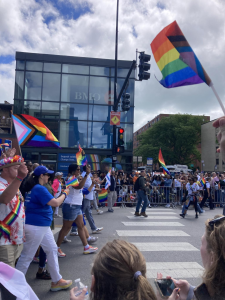Nike and Serena Williams call for “crazy women”
March 20, 2019
Nike is still riding the train of controversial ads, first with Colin Kaepernick and now with Serena Williams’ whose new commercial calls out the biases placed on strong women.
In the “Dream Crazier” commercial, which aired during the Oscars on Feb. 24, Williams narrates a script starting out with “If we show emotion, we are called dramatic,” while videos of female athletes crying shows moments in sports where women have been critiqued. One of the women featured is sabre fencer Ibtihaj Muhammad, the first Muslim American woman to wear a hijab while representing the United States in the Olympics.
The ad is a great representation of what a commercial aimed at women should be like. It stars Serena Williams, world famous tennis player, who often gets represented and called out for her behavior on the tennis court. Williams is often the protagonist in a “angry black woman” narrative by judges and critics for her behavior when she gets emotional on a court. The same criticism is rarely placed on male athletes, even the soccer players who fall down crying while faking an injury in those viral videos we all laugh at.
Nike has been changing the direction of their ads and taking on social political controversies that have been in the media lately. Their past ad, featuring Kaepernick, made national headlines for resurfacing the issue of kneeling during the national anthem. Their “Dream Crazier” ad tackles the issue of how women athletes are perceived and valued.
The video features the U.S Women’s National Soccer Team, who have won three World Cups and four Olympic medals, who made more headlines in 2016 for their fight against the U.S Soccer Federation for equal pay compared to the men’s soccer team. Equal pay has always sparked a feminist movement, as women clearly deserve to earn the same as men, especially if they have brought the U.S three World Cups compared to the zero titles the men’s soccer team has brought home.
The video also shows female athletes, such as American-Israeli basketball player Sue Bird, behaving in a manner that many critics would deem “unlady” like. The idea of an athlete being considered unlady like while playing a sport is extremely disturbing. It plays back to the idea that women exist solely for men to enjoy watching them. Women exist for themselves, no one else.
I didn’t play a lot of sports growing up but in my twenties I did play rugby for a couple of seasons until a back injury took me out of the game. During my time in rugby, I learned a lot about myself and the value of being an athlete. No one on my team cared if I didn’t act like a lady, they needed me to play hard so that we could score. I tackled other players into puddles of mud, chugged water and spit it back out to wash out the dirt from my mouth, and I went seasons without wearing makeup because I was too tired from practice and games. In fact after spending time with them I realized that I spent a lot of time caring how other people perceived me.
The stereotypes placed on certain sports can also discourage girls to play. When I first joined a rugby team I heard a lot of crackling from my friends, joking if this was my way of coming out. To their surprise I wasn’t the only straight player on my team. This isn’t the first time a woman playing a “rough” sport is stereotyped. But sports don’t belong to only one sexual orientation, just like I don’t belong to one specific gender.
The word “crazy” is used throughout the ad to describe different aspects of how female athletes are perceived. If they show emotion, crazy. If they play a sport that has long only been associated with men, crazy.
Just like Williams says, let them call you crazy. Peoples opinions are always going to be there but they are never going to really matter. As long as you are doing something that you love, who cares if people think you are crazy.





